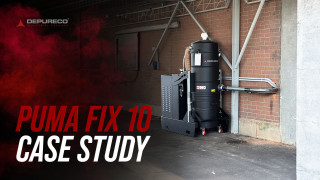HEPA filtration is very important in many industrial processes. In fact, vacuum cleaners equipped with HEPA filters are used in many industries and for some of the most diverse applications. In some cases, they are necessary for the safety of production operators.
What are HEPA filters on industrial vacuums?
The term “HEPA”, is an acronym for “High Efficiency Particulate Air [Filter]”, referring to a type of high efficiency filter certified for the capture of airborne particles down to .3 µm.
According to ISO standards, a filter is classified according to the percentage of 0.3 µm particles it can remove. In order to acquire a HEPA certification, the filter must meet the requirement of between 99.97% and 99.995% efficiency.
Specifically, there are two main types of HEPA filters:
– H13 with an efficiency of at least 99.97%
– H14 with an efficiency of at least 99.995%
All Depureco Industrial Vacuums can be configured with a HEPA H14-certified filter, supplementary to the primary filter
Thanks to HEPA H14 certified industrial filters, it is possible to filter very fine and hazardous dust.
Examples of hazardous dust captured by HEPA H14 filters:
– Silica dust
– Polishing powders
– Powders of composite materials such as carbon fiber and glass fiber
– Cement powders and building materials
– Asbestos dust
– Food powders such as cocoa and milk powder
– Chemical powders
– Powders deriving from the pharmaceutical industry
– Powders in the cosmetic industry

How do HEPA filters work?
Particle filtration occurs primarily in 4 different ways, depending on the type of particle:
1. IMPACT – Large Particle
The particles are too large to pass through the holes in the filter medium and remain trapped on the outside of the material.
3. INTERCEPTION – medium size
Air carries particles through an intricate fiber structure, and the particles impact on the surface of these fibers, becoming trapped.
4. DIFFUSION – small size
Diffusion acts on the smallest particles that collide with each other and with other particles. Their direction changes very quickly and loses speed. This type of movement eventually causes particles to collide with the fibers of the HEPA H14 filter medium.

Ask a Depureco expert for more information on the best filtration solution for your specific application.










